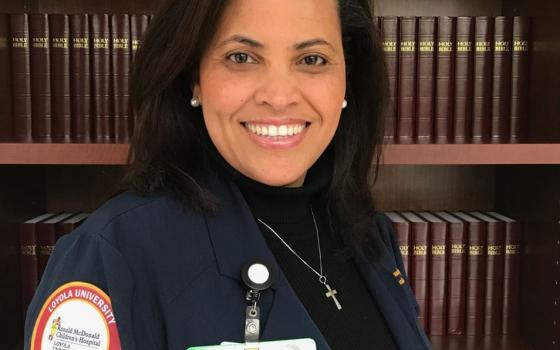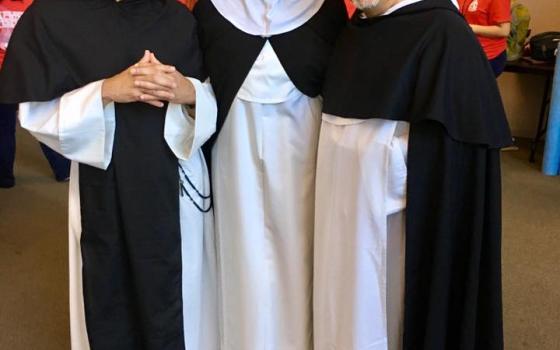Sr. Xiomara Méndez-Hernández's journey to becoming an Adrian Dominican began in the fashion world, continued as an associate, and was made official when she professed her final vows Dec. 18 in Santo Domingo, capital of her home country, the Dominican Republic. Today, she's a board certified chaplain for Loyola University Medical Center in Chicago.
The first Adrian Dominican to do her formation in the United States but profess her vows on the island, Méndez-Hernández is honing her background and passion for cultures to lead her congregation toward embracing interculturality — a burgeoning theme for congregations around the world that are becoming more diverse.
In a conversation with Global Sisters Report, Méndez-Hernández talked about the transition from fashion designer to associate to sister and how her spirituality has been awakened with each step in that evolution.
GSR: Tell me about your journey to becoming an associate.
Méndez-Hernández: When I was 19, a Dominican sister was preaching for a Lent retreat in my parish. I was a freshman at Universidad Autonomo de Santo Domingo, and seeing a woman preaching, I thought, "Wow." Then I saw another woman doing a spiritual liturgical kind of dance, and these two women didn't have habits. I didn't know that sisters were able to wear secular clothes.
The joy they had and the depth of the talking about their personal relationship with God, it drew me. And I was never drawn to religious life because [the sisters I always knew] were very strict, very serious. It was just a different experience, and I wanted to know this woman.
I was studying to be a fashion designer, and so I continued my life. The year after, our local priest invited us to go to the mountains for another journey with a Bible class. It was again with two women, and it just so happened that these two women were also Dominican sisters. They taught us about the Bible, and it felt so different — I'm a Bible lover, which is weird for a Catholic, at least at that time. She started first with history: the history of our country and how God walked with us. I fell in love with them, with that way of looking at spirituality. At that time, I was 21, and I started visiting the sisters. But I was not ready. They eventually moved from the parish to a religious house, and I lost contact with them.
In my late 20s, I met them again, and they invited me to be an associate, and I was thrilled that I could be praying with them. I fell in love. By that time, I had a master's degree, and I was teaching fashion. I was in a different world, with fashion shows and runways. That was my life. But then I had a longing to become closer to God, to find more meaning not about me and myself and being successful. I was more into what was meaningful — not only for me, but for others.
Why did you decide to take your final vows?
I knew there was something special I was feeling when I met the nuns, but I was not ready to discern or to take the time to explore that call, as we would call it now. When I decided to join the congregation, I think I had my mind set already that this was serious. It was a commitment. Leaving my country and selling my business [which designed clothes for marketing events and fashion shows] was a huge, huge thing. Leaving my career and telling my family I was leaving everything behind — it was big.
I took my first vows in 2011, and I knew that my first vows were my final, that the next years were just a preparation to confirm that, yes, this was a good fit for me and the congregation. The discernment wasn't easy. Speaking a second language and going from a professional woman to starting from scratch was hard for me. But to feel in that journey, confirming in every step, that I was not alone, that I had a better purpose for my life — that made me say yes to forever. Not to today, but to forever.
Has that transition had an effect on your spirituality?
I think so. I became more intentional about my relationship with God, which affects my relationship with others. Religious life is not only about me and God. It's about God, creation, my relationship with my brothers and sisters, having that passion and compassion with one another as beloved creations of God, and to see God in everything and all. That is the thing that has changed. And I have more time. Well, no, I make time. I'm intentional to be in that relationship with God in order to be in that relationship with others.
You've attended conferences and discussions on interculturality and have played a part in your community's approach to that. How is that going now?
I am blessed that my congregation has become more and more intentional to be culturally inclusive, culturally aware. One of my passions is equality and equity and seeing everything as a manifestation of God. I became part of our focus group on what we should do to bring more diversity and to be more aware, to be more inclusive.
I was chosen to go to [Catholic Theological Union in Chicago] as part of the diversity program because I was part of this group. We have a name, "Toward Communion: Undoing Racism, Embracing Diversity." It's something we're developing as a congregation, and it's a big project.
We're trying to face our own bias and what is hindering us from being in common union. How can we get to that loving community that God and Jesus invited us to form in order to bring about the reign of God?
This is why, when they asked where I wanted to celebrate my vows, I said I wanted to do it in the islands. Not only because I would be closer to my family and they could come, but also because I wanted to bring to witness my "yes" to God with a diverse group: people from the U.S., from other cities within the country, and my group of friends, which is very diverse, from Africa, from Cuba, the Philippines. I try to bring all groups, white, black, Latinos, to be intentionally part of the celebration, and how beautiful that can be.
[Soli Salgado is a staff writer for Global Sisters Report. Her email address is ssalgado@ncronline.org. Follow her on Twitter: @soli_salgado.]



